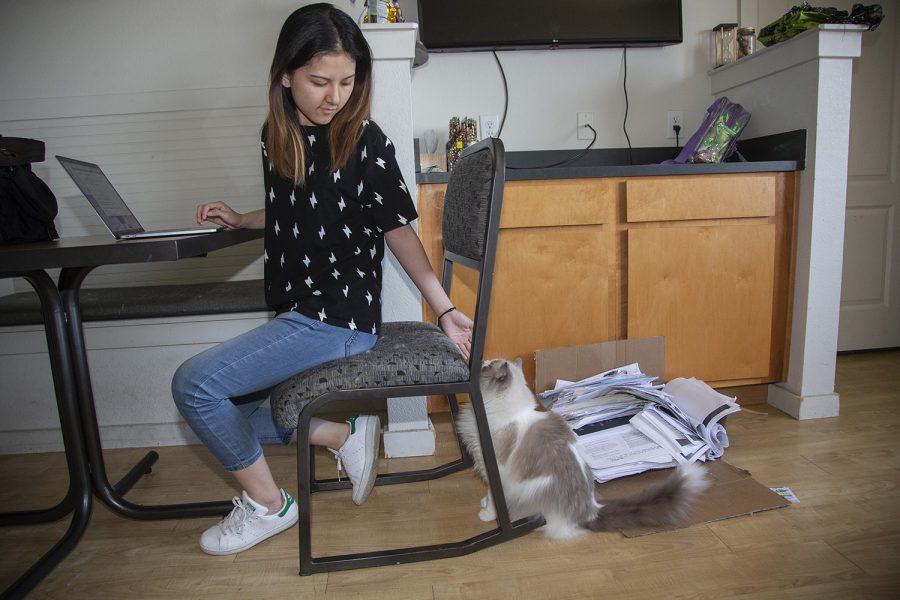UI Chinese students face difficulties as international tensions increase
Life for Chinese international students is becoming more complicated as a result of tensions between the U.S. and China.
International student Yao Wang sits in her apartment in Hawks Ridge on July 8, 2019. Wang is studying Computer Science and is in her final semester. (Katie Goodale/The Daily Iowan)
July 9, 2019
Yao Wang, a Chinese student at the University of Iowa, said that while she likes studying computer science, she would rather study something such as cyber security.
But, she said, the major is too “high risk.” The U.S. State Department and FBI are urging universities to monitor Chinese students and implement policies to prevent those students from stealing U.S. technology.
Life for Chinese students is growing more complicated as a result of the tensions. Forcing students to apply for visas every year creates a lot of pressure on students halfway across the world from home.
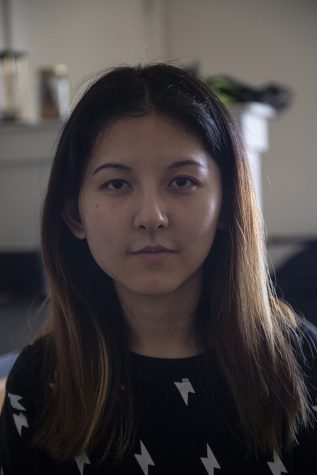
International student Yao Wang sits in her apartment in Hawks Ridge on July 8, 2019. Wang is studying Computer Science and is in her final semester. (Katie Goodale/The Daily Iowan)
“If you’ve already spent two years here, and something goes wrong, it’s really hard for us to make that up,” said Wang, who is entering her senior year. “It’s a very frustrating process to go through if you have to go through it every year.”
As of last year, Chinese students who are pursuing a degree deemed a “sensitive major” must renew their student visa every year and undergo a background check at the request of the State Department.
The State Department has not issued a list for what areas of study are considered sensitive and has not told the UI what the sensitive areas are and how many students are studying in them.
Sen. Chuck Grassley, R-Iowa, is leading an investigation by the Senate Finance Committee into intellectual property theft by Chinese institutions from American research universities. Adding to international tension, the U.S. and China are in the midst of an ongoing trade/tariff dispute.
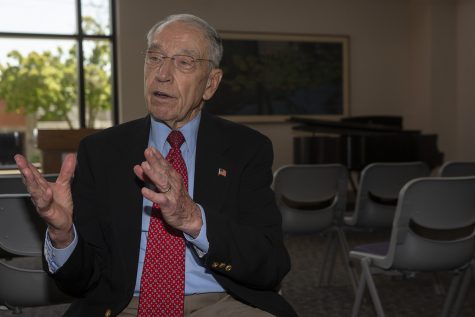
U.S Senator Chuck Grassley, R-Iowa, speaks with reporters during a press conference at Mercy Hospital on July 2, 2019. (Katie Goodale/The Daily Iowan)
Lee Seedorf, the UI International Programs senior associate director, said she has not seen an unusual increase in the number of UI Chinese students being denied visas. She said the policy likely affects graduate students in STEM fields the most.
In 2015, 4,120 students from other countries were enrolled at the UI. In 2018, that number dropped to 3,163. A decline in international students heading to the UI can have economic effects on the community.
In the beginning of the summer, the Chinese government issued study-abroad alerts via social media, saying that because of tensions between China and the U.S., students may have a hard time getting visas and might be mistreated by American visa officers. Seedorf said the alerts included other information that seemed to be more based on rumors than facts.
“Other warnings included information making it sound like the U.S. is very unsafe, which you know there are degrees to that, but it made it sound like you would most certainly be shot if you came here,” Seedorf said. “It made [the U.S.] sound very scary.”
RELATED: Grassley raises concern for safety of U.S. intellectual property
After seeing those alerts, Seedorf said, she sent inquiries to Chinese students enrolled at the UI. Everyone had received visas.
“Some [students] even mentioned the visa officer was very friendly,” Seedorf said.
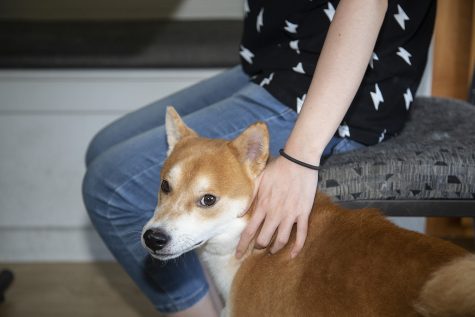
International student Yao Wang pets her dog Bravo in her apartment in Hawks Ridge on July 8, 2019. Wang is studying Computer Science and is in her final semester. (Katie Goodale/The Daily Iowan)
Wang said she received the alerts while she was already on campus, and they did not make her feel threatened in any way. However, she said, she had a friend who attended the UI for her undergraduate studies and planned on pursuing a graduate degree, but the alerts frightened her friend’s parents, who had her move to a university in Canada for graduate school.
Grassley started investigating foreign threats to taxpayer-funded research in the fall of 2018, and the investigation has continued. Grassley held hearings in the Senate Judiciary Committee in December 2018 on threats specifically posed by China. In April and June, Grassley led hearings in the Senate Finance Committee, where he is now the chairman, calling on a vetting process on the recipients of federal funds.
Additionally, the FBI is urging research universities, which include the UI and Iowa State University, to monitor some Chinese students more closely. University officials are being asked by the FBI which labs the students work at and what information they are exposed to, according to a report from NPR.
In an interview with The Daily Iowan, Grassley said UI and ISU should take the extra step in monitoring Chinese students and scholars because the research facilities accept federal funds, which could put taxpayers’ money at risk.
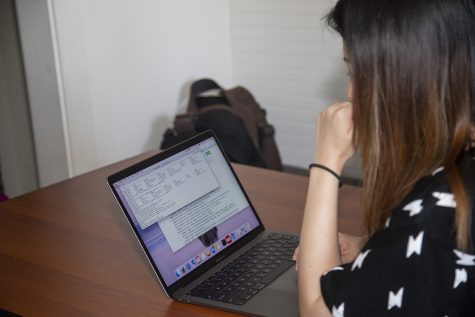
International student Yao Wang sits in her apartment in Hawks Ridge on July 8, 2019. Wang is studying Computer Science and is in her final semester. (Katie Goodale/The Daily Iowan)
“You have got to know what they’re doing,” Grassley said about Chinese students. “It’s not only an intellectual-property-theft issue, it’s a national- security issue, too.”
Grassley wrote letters to the Justice Department and the Defense Department looking for details on how those departments identify foreign threats. He also asked the National Science Foundation and the National Institutes of Health about their vetting processes.
Grassley said that before commenting on any questions about the vetting from the DI, he wants to wait until he gets answers from his letters.
Editor’s note: The Daily Iowan originally stated that the number of international students enrolled at the UI in 2015 was 2,597, and that in 2018 that number decreased to 1,768. These numbers were referring to the undergraduate population.



